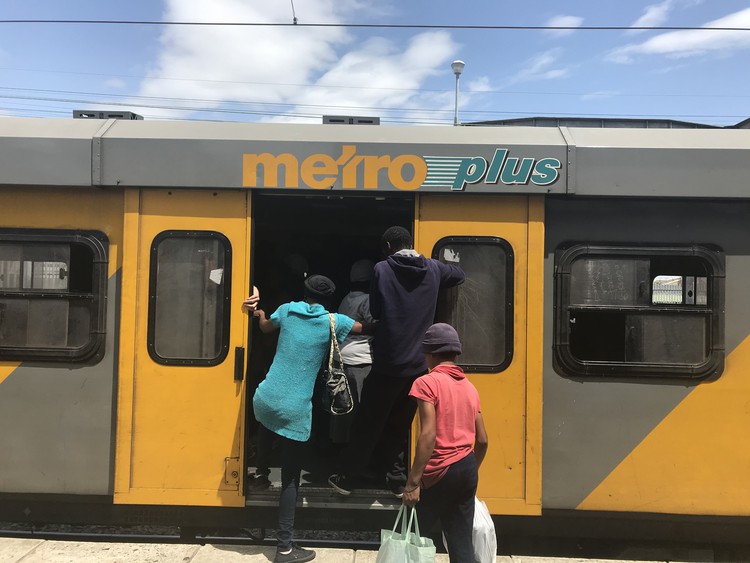Train commuters protest after being told to move to second-class carriage
Metrorail apologises for ticket conductor’s behaviour
A ticket inspector on Metrorail’s northern line was met with a protest by frustrated commuters who refused to move from a MetroPlus (first-class) carriage to Metro (second-class) carriages that were already packed to capacity.
“I have had it with Metrorail’s unprofessional and unreasonable staff,” shouted Fredrick Goliat, a monthly metro ticket holder. He was travelling from Cape Town to Goodwood with his child on Wednesday when the ticket inspector demanded that he and other metro ticket holders disembark from the only carriage with available seating space.
“Metrorail ticket inspectors should be grateful that commuters are still buying tickets regardless of terrible service. A few times a week I use a taxi because of train cancellations and delays,” he said.
Ticket prices for MetroPlus carriages are higher than Metro tickets. For example, a Bellville to Cape Town monthly Metro ticket costs R150 and R8 for a single trip while a MetroPlus monthly ticket is R280 and R12 for a single trip. Years ago MetroPlus ticketholders were likely to get a seat on reasonably maintained and less congested carriages.
Now all commuters have to put up with delayed or cancelled trains, carriages with missing windows, doors that cannot close and broken seats. During rush-hour only the very lucky can sit. The burning of train carriages has also resulted in fewer carriages in services, even during peak-hours.
On Wednesday, Goliat and other Metro ticket holders said they had had enough and refused to move to the congested Metro carriages. A train normally has four metro carriages but on this day only had two. The ticket inspector then threatened to either stop the train or call the police to remove them. Commuters were seen pleading with the inspector, explaining that the Metro carriages were overcrowded and that another train wouldn’t be coming for a while.
After witnessing the incident, GroundUp raised the issue with Metrorail spokesperson Riana Scott who apologised for their inspector’s conduct. “It is unfortunate that we lack sufficient capacity due to the high levels of damage to infrastructure and train fleet,” she said. “Weighing up the rights of all commuters is a tough call as we are inundated with complaints from MetroPlus customers who pay a premium for their travel [but carriages] are occupied by Metro customers.”
Zackie Achmat, of the commuter activist group #UniteBehind condemned the harassment of passengers, particularly vulnerable people like women and children. “Inspectors have a legal duty to protect women and children from unsafe conditions on trains. This incident illustrates the contempt PRASA holds for commuters, the Constitution and courts. We will return to court to ensure that all commuters especially the vulnerable commuters are protected,” he said.
Class distinction on trains is outdated and unnecessary
By GroundUp Editors
The separation of South Africa’s commuter trains into MetroPlus and Metro should have been done away with many years ago. Very few cities around the world with decent commuter train systems have class distinctions.
No matter which carriage you travel in, you should expect to get to and from work safely and on time. All carriages should be in good condition. It’s probably a bit much to expect to travel comfortably during rush-hour, but you should at least be able to stand securely without having your personal space erased.
In Cape Town, the class distinction between Metrorail trains has broken down because of dysfunctional chaos. Yet two ticket prices are still charged and, as the story above shows, ticket inspectors still enforce it.
Spare a thought though for the poor ticket inspector. He’s probably poorly trained, not very well paid, and trying the best he can to do with what he imagines is his job. He is also at the frontline of commuter anger that has been caused by incompetent and corrupt PRASA managers.
Support independent journalism
Donate using Payfast

Don't miss out on the latest news
We respect your privacy, and promise we won't spam you.
Next: Protest shuts down overcrowded school
Previous: Why Makhanda residents are taking their municipality to court
Letters
Dear Editor
I found this article very interesting in the issues it raises around the maintenance of a class system in the public transport issue. More so by the response by Unite Behind by not even highlighting the issue as a class apartheid. With the diminishing rolling stock the practicality of maintaining anti-social economic structure would seem insane unless it plays to keeping commuters fighting amongst themselves rather than the government and management of PRASA.
I said as much to Unite Behind in a message sent to the facebook page ie, "In the interest of a just and equal society and the fixourtrains campaign should'nt there be a call to remove the class system on the public trains?" With no reply makes one wonder what they agenda really is!
© 2020 GroundUp.
This article is licensed under a Creative Commons Attribution-NoDerivatives 4.0 International License.
You may republish this article, so long as you credit the authors and GroundUp, and do not change the text. Please include a link back to the original article.

